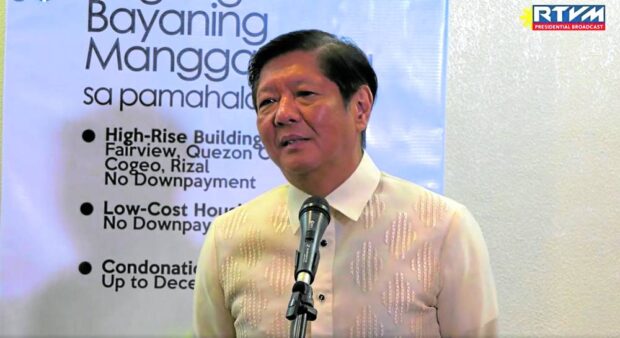
President Ferdinand Marcos Jr. —PHOTO FROM PCO WEBSITE
MANILA, Philippines — The deal with a South Korean agriculture machinery company for a cooperative partnership puts the Philippines a step closer to mechanization of the industry and a higher productivity, President Ferdinand Marcos Jr. said.
According to the Presidential Communications Office (PCO), Marcos lauded the signing of a memorandum of understanding (MOU) between the Department of Agriculture (DA) and the Korea Agricultural Machinery Industry Cooperative (KAMICO) on Tuesday, as it would boost efforts towards food security.
Marcos, who graced the ceremonial signing in Malacañang, is the concurrent Agriculture Secretary.
“We all recognized very clearly the importance of mechanization for our country because we are trying to move the production, we are trying to make sure that at least the local supply for rice is sufficient and, of course, hopefully, also the other crops,” Marcos said.
“The key to all of this is mechanization and all of the things that we’re trying to do. We have some programs to mechanize. We have the RCEF program, in which is the collections from the tariffs on rice importations are then applied also to mechanize,” he added.
PCO said that the MOU between DA and KAMICO includes the following:
- Establishment in the country of a local agricultural machinery manufacturing cluster including assembly production line
- Research and development of agricultural machinery technology
- Workforce training on agricultural machinery technology
- Grant of Official Development Assistance (ODA) to further explore potential projects
An initial investment of $30 million would be made for the first phase of the project, a KAMICO official said as relayed by PCO. The amount would be tripled in the second phase.
“The project is expected to result in food production self-sufficiency; the Philippines becoming a food-exporting country; increased employment and farmers’ income; establishment of infrastructure on agricultural mechanization and industrialization; and, technology transfer and production of specialized machinery,” PCO said.
“Establishing local machinery production is the first step towards agricultural development, Marcos said, expecting it to result in better yield and lower production cost to make Filipino farmers more competitive,” it added.
PCO said that this is not the first time though that KAMICO would have a tie-up with DA. Previously, the two also worked on the adaptability testing of a self-propelled Mechanical Elevating Work Platform which was used for mango production, and a technology performance verification for a mechanized onion production system.
There are also ongoing projects between DA and KAMICO:
- Pilot adoption and pre-commercialization of the Philippine Center for Post-harvest Development and Mechanization (PhilMech) – KAMICO developed corn mill
- Technology advice and solutions from South Korea
- Agricultural Mechanization Design and Prototyping Center project
PCO said that KAMICO is an active player in South Korea’s agriculture sector, providing solutions to the global agricultural machinery industry by “providing aid to developing countries, dispatching investment research groups to emerging markets overseas, and conducting training for international customers.”
READ: 30 Korean firms eye farm equipment assembly plant

